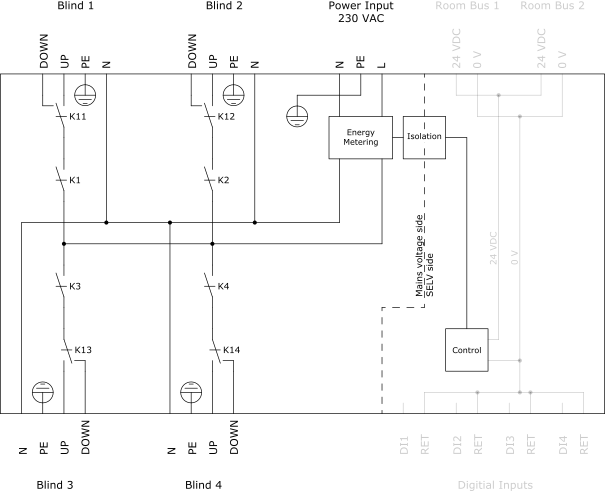
Concept
High-Voltage Blind Outputs
The high-voltage blind modules have four Blind outputs for control of motorized window blinds that are powered by AC mains voltage (230 VAC).
The Blind output connector has four terminals for blind motor control and power distribution:
↑ (UP)
↓ (DOWN)
N (Neutral)
PE (Protective earth ground)
The connector has a 5-pole frame, but only four poles are used in this application. Pour plus d'informations, voir RP Controller Expansion Module Pluggable Connectors .
The four outputs are independently controlled. The blind module uses two relays connected in series to control each output:
One relay to select the ↑ (UP) or ↓ (DOWN) terminal
One relay to connect or disconnect the AC mains voltage to the selected terminal
In the figure below, the two relays are named K11 and K1 respectively for the Blind 1 output, K12 and K2 for the Blind 2 output, and so on.
The relays can be inadvertently put in the On state due to mechanical shock during transportation. Ensure that the blind module is powered up by the RP-C room bus (24 VDC) before turning on the AC mains voltage (230 VAC) or connecting the AC mains voltage to the blind module. Otherwise, there is a risk that the blinds or awnings are driven to their end position and cannot be retracted.
At startup, the relays are set in a predefined state so that the AC mains voltage is disconnected from the four Blind outputs.

The module's AC mains voltage side and low-voltage side (SELV side) are galvanically separated by means of isolation circuitry.
The module also has energy metering circuitry that supports the measurement of the energy consumption for the total load connected to the module. Pour plus d'informations, voir RP Controller Expansion Module Energy Metering .
The blind module is designed for use with blind motors with automatic end stop detection. The blind module requires a defined end stop at the top position. An end stop at the bottom position is recommended, but not required.
To move the blinds up or down, the blind module activates the two relays so that the AC mains voltage is connected to either the ↑ (UP) or ↓ (DOWN) terminal. For venetian blinds that use one motor to control both the position of the blinds and the angle of the slats, the angle is also controlled through these two terminals. The mechanics of the venetian blinds is such that the up/down movement of the blinds begins with a rotation of the slats. This initial phase of the up/down movement is used to control the angle of the slats, by connecting the AC mains voltage to the ↑ (UP) or ↓ (DOWN) terminal only for a short time period.
To achieve absolute control of the position of the blinds and the angle of the slats, measurements and calibration need to be performed during commissioning. The time it takes for the blinds to travel from the bottom to top position, and from top to bottom position, needs to be measured. The time it takes for the slats to fully rotate in one direction, as well as the opposite direction, needs to be measured. The results from the measurements are entered in the EcoStruxure Building Operation software to calibrate the position of the blinds and angle of the slats. Pour plus d'informations, voir Configuring Blinds in RP Controller Expansion Blind High Voltage Power Modules .
Spécifications
Outputs
|
4, Blind 1 to Blind 4
|
Output terminals
|
N, PE, ↑ (UP), and ↓ (DOWN)
|
Output voltage
|
230 VAC (same voltage as power supply)
|
Maximum load current
|
Maximum 2 A load per output
|
Maximum 8 A total load for the 4 outputs
|
 RP Controller Expansion Modules and Multi-sensors
RP Controller Expansion Modules and Multi-sensors
 Blind Modules
Blind Modules
 RP-C-EXT-BL-4-HV-PD
RP-C-EXT-BL-4-HV-PD
 RP Controller Expansion Module Pluggable Connectors
RP Controller Expansion Module Pluggable Connectors
 RP Controller Expansion Module Energy Metering
RP Controller Expansion Module Energy Metering
 Configuring Blinds in RP Controller Expansion Blind High Voltage Power Modules
Configuring Blinds in RP Controller Expansion Blind High Voltage Power Modules